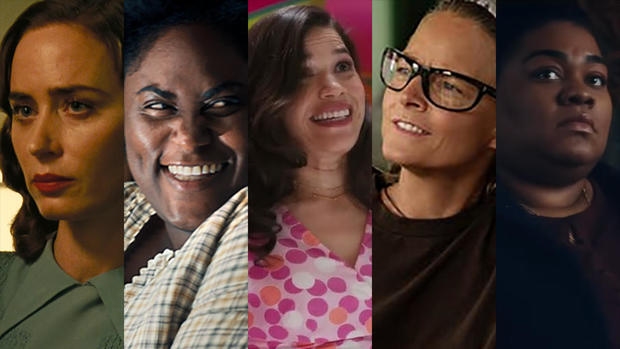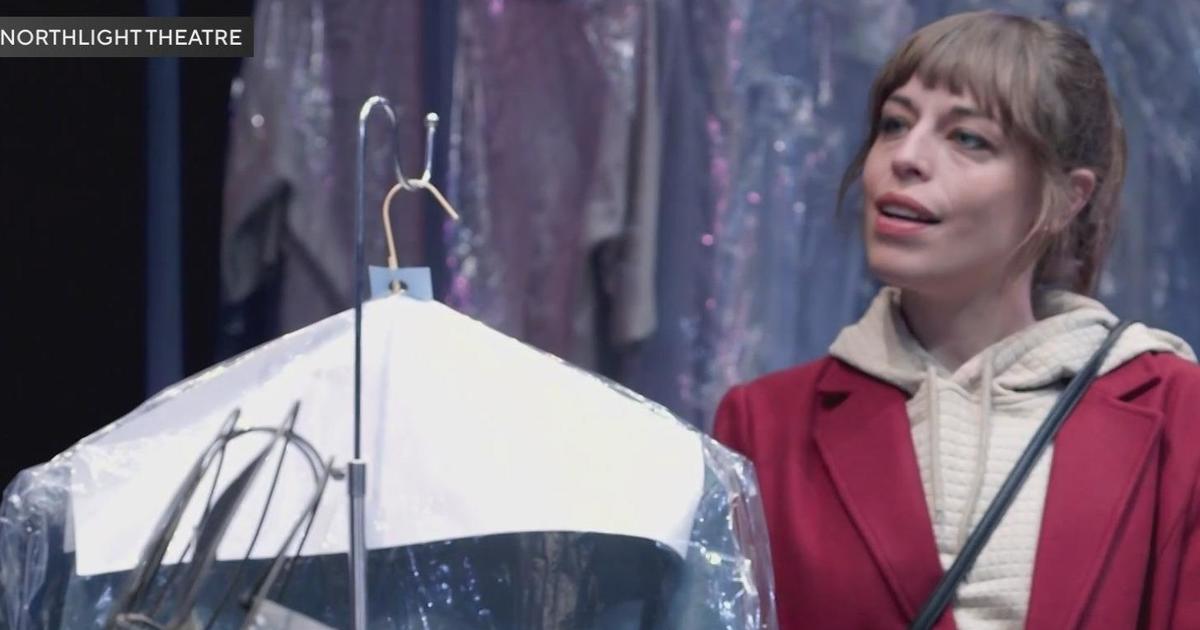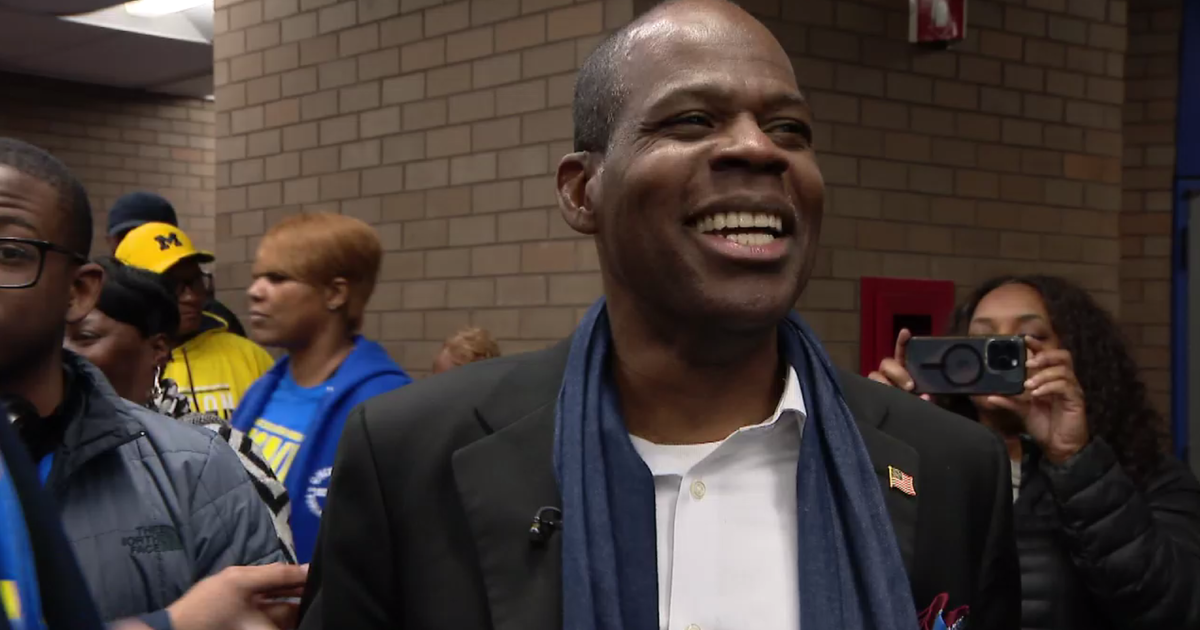Behind the scenes with the best supporting actress Oscar nominees at the 2024 Academy Awards
Watch scenes from the performances nominated in the category of best supporting actress at the 96th annual Academy Awards, as well as interviews with the Oscar nominees below. The 2024 Oscars were presented on Sunday, March 10, and you can see the list of winners here.
Emily Blunt, "Oppenheimer"
Christopher Nolan's "Oppenheimer" is centered on the enigmatic physicist whose work becomes the basis of the first nuclear weapon. But J. Robert Oppenheimer (played by best actor nominee Cillian Murphy) is, in the words of his Army overseer, Gen. Groves, a "womanizer," and so his personal life threatens to derail him just as he's completing work on the atomic bomb.
In this scene, Oppenheimer meets Kitty (nominee Emily Blunt) at a party. Immediately the two pick up on each other's vibes. She's married, but that doesn't seem to matter to either of them:
Robert and Kitty would marry, but Oppenheimer maintained his emotional attachment to Jean Tatlock (Florence Pugh), and carried on an affair with her. He then fell apart, shattered upon learning of Jean's death. After the war, when a smear campaign about Oppenheimer's loyalty — including his attachment to Jean, an avowed communist — drags him before a hearing orchestrated by the Atomic Energy Commission, Kitty stands up to the withering questioning of Roger Robb (Jason Clarke), who is investigating the political leanings of her husband:
Blunt received her first Oscar nomination for her performance.
In an interview with the British Film Institute, Blunt praised Nolan's screenplay, but also credited the source of the film, Kai Bird and Martin J. Sherwin's "American Prometheus." "[It] was hugely helpful and revealing of the inner workings of these people, and that is what you search for: what are these little nuances that can unlock this person for me? There were wonderful segments about their marriage and just how complicated, tempestuous but successful it was — a couple of comets coming together. And great stuff about her and how difficult a person she was. …
"I thought she should speak at a great velocity so that she's like a hurricane coming into his life and turning it upside down a bit. And she is a fiercely bright woman. She's sharp-edged. Also, there's a journey that they both go on. She deteriorates throughout the course of the film. There were a couple of screen gem actresses that I looked at from back in the days, starting as ingénues. And one in particular, who I've never really named to anyone, who then did hit a big drinking period and her voice and her whole demeanor really changed as she became this sort of brittle, difficult person; I was fascinated with her." She did not wish to name the actress, though: "I don't, because it's going to be a soundbite and I don't want it to. And because I steal from the essences of a bunch of people."
One of Kitty's characteristics was her heavy drinking, which actually posed a threat to keeping her family together. In this appearance on "The Late Show Starring Stephen Colbert," Blunt explained her proficiency at playing a character who is inebriated: "I feel like, when you are really drunk, you do everything you can to pretend that you're not, so it's sort of not playing drunk. I think there's a certain focus that happens. Like, the eyes are still but the body's not quite inside of itself?" And no blinking. "Because that shows weakness and a lack of focus."
Blunt also described her comfort level with horseback riding in the film. She'd been primed after appearing in the Western miniseries "The English." "I think Chris got quite excited by our scene where we did a bit of a canter up a hill. … And so then he goes, 'I've got the camera, do you want to do a kind of gallop across the plains?' And I heard Cillian go, 'Uhm … oooh … uhhh…' And then I was really game for it, so Cillian had no option. I just left him in the dust!"
Emily Blunt on a deleted scene from "Oppenheimer" ("60 Minutes"):
"Oppenheimer" is streaming on Peacock and is available via VOD.
More on the making of "Oppenheimer":
- "Oppenheimer" star Cillian Murphy on the preparation, hard work and instinct behind his acting ("60 Minutes")
- Cillian Murphy opens up about challenges of playing J. Robert Oppenheimer and potential "Peaky Blinders" film ("CBS Mornings")
- Christopher Nolan on J. Robert Oppenheimer, "the most important person who ever lived" ("Sunday Morning")
- Christopher Nolan: "Bittersweet" to have "Oppenheimer" cast leave London premiere amid SAG-AFTRA strike ("CBS Mornings")
- "Oppenheimer" 70mm film reels are 600 pounds — and reach IMAX's "outer limit" due to the movie's 3-hour runtime
- "Oppenheimer" wins best picture at the British Academy Film Awards
Danielle Brooks, "The Color Purple"
In "The Color Purple," a musical adaptation of the classic Alice Walker novel, three women in the 1930s South — Celie, Sofia and Shug — reinforce their sisterhood and stand up to oppressive male figures. In the case of Sofia (played by nominee Danielle Brooks), her relationship with her husband, Harpo, would turn violent, and she fights back against his abuse.
In this scene, Sofia knows how to make an entrance, introducing herself to Harpo's father, Mister (Colman Domingo):
Brooks had seen the musical "The Color Purple" when she was 15, and it changed her life: "I saw people who looked like me," she told The Guardian. "Their skin was dark like mine. Felicia P. Fields [who played Sofia] was a plus-size woman. Oh my gosh, this was spiritual work. And, of course, I grew up in church all my life. … I could suddenly clearly see where I could go."
"Singing 'Hell No' for me became an anthem," she said. "Hell no to my fears. No to impostor syndrome, no to believing I'm not enough."
Her road would lead her to Juilliard, and to making her Broadway debut playing Sofia in the 2015 revival, for which she was nominated for a Tony Award.
Brooks learned that she'd won the role in the movie adaptation when she got a phone call from the actress who'd played Sofia in Steven Spielberg's 1985 film: Oprah Winfrey, one of the producers of this new musical version. "In that moment, I knew I could feel it in every inch of my body my life was about to change," Brooks told "CBS Mornings."
"I have a responsibility to all of the Sofias that are living in this world," said Brooks. "They need a voice that needs somebody to speak for them, which [Oprah] was for me, and now I can be for someone else."
In an interview with The New Yorker, Brooks described coming back to the role of Sofia in "The Color Purple" film — and what it means to her now, as a wife and mother: "This is still, in my 11-odd years of being in this industry, my first studio film. I've done a ton of independent films, but this is my first studio film. It's a cutthroat business. This acting thing I just deemed as fun, my therapy, my happy place — there's a business attached to it, and it's not always fair, and it's not always kind, and it's definitely not for the weak."
But, like Sofia, she is no shrinking violet. When asked by Backstage for any advice to younger actors, Brooks replied, "The thing that makes you cringe about yourself is your superpower. I used to really get down on myself for being a plus-size girl, being dark-skinned, having curly hair. Really start to embrace who you are, and know that that's what's going to differentiate you from the pack."
Brooks has also appeared on Broadway in "The Piano Lesson," and was executive producer of "Ain't Too Proud." She won three Screen Actors Guild Awards as part of the cast of the series "Orange Is the New Black." "The Color Purple" represents Brooks' first Oscar nomination.
"The Color Purple" is streaming on Max, and is available via VOD.
More about "The Color Purple":
- Taraji P. Henson on "The Color Purple" ("Sunday Morning")
America Ferrera, "Barbie"
Writer-director Greta Gerwig's film, based on the iconic doll, was no mere child's play. The screenplay she fashioned with Noah Baumbach was both a celebration of the aspirational role that Barbies have played with millions of girls, and also an indictment of the very real challenges that those girls face, growing up in a world that often celebrates image over substance, and that doesn't always herald or appreciate women's work, accomplishments and sacrifices.
Oscar-nominee America Ferrara plays Gloria, a mother, wife and employee at Mattel, who sketches new "sad and weird" Barbie designs (Irrepressible Thoughts of Death Barbie, anyone?), who then encounters her childhood Barbie come to life.
In this scene, Gloria describes to Barbie (Margot Robbie) the complexities, contradictions and social pressures women experience in a world where they must be all things to all people, and can't just be:
Ferrera told Vanity Fair that, when reading the script, Gloria's monologue hit her as powerful and meaningful: "It also felt like, wow, what a gift as an actor to get to deliver something that feels so cathartic and truthful. But it also felt like this pivotal moment that I obviously didn't want to mess up. There was a little bit of healthy pressure around it."
She estimates she performed it 30 to 50 times on camera. "There were no targets to hit. It was much more a moment-to-moment drop in. Truly, every take was very different. There were takes that leaned into anger. There were takes that leaned into laughter. It really did, over the course of filming, find a shape. It was about just staying as present in the moment and just seeing really where the words would take it."
The duality of Gerwig and Baumbach's screenplay pulled her in to the project. As she told Harper's Bazaar, "I read the script and I was laughing on page one, then I was crying, and then I was laughing and crying."
Perhaps a sign of just how good a performance she gives is the fact that, by her own admission, Ferrera was never "a Barbie girl." She told Harper's, "I didn't play with Barbies for a number of reasons. We couldn't afford them. And they just didn't resonate with me. I didn't see myself reflected in that world in a way that captured my imagination. ...
"What's exciting about being a part of this movie about such an influential icon in our culture is getting to expand and shift the narrative to include more of us, so young girls and boys can see themselves in something so dominant," she said.
Ferrera came to notice starring in the 2002 Sundance hit "Real Women Have Curves," followed by her title role in the TV series "Ugly Betty," for which she won the Golden Globe, Emmy and SAG Awards. "Barbie" marks Ferrera's first Oscar nomination.
"Barbie" is currently streaming on Max, and is available via VOD.
More on "Barbie":
- Greta Gerwig: The "60 Minutes" Interview
- "Barbie" has biggest opening day of 2023, "Oppenheimer" not far behind
- The "Barbie" movie used so much pink paint it caused a shortage
- Oscar nominations 2024 snubs and surprises: No best director nominations for Bradley Cooper, Greta Gerwig
- Ryan Gosling, Oscar nominated for "Barbie" role, speaks out after Academy snubs Margot Robbie, Greta Gerwig
- Ryan Gosling performing Oscar-nominated song "I'm Just Ken" from "Barbie" at 2024 Academy Awards
Jodie Foster, "Nyad"
In "Nyad," nominee Jodie Foster stars as Bonnie Stoll, a friend and coach for endurance swimmer Diana Nyad (best actress nominee Annette Bening), who is determined to fulfill a long-held dream of swimming from Cuba to Florida, a feat that she'd failed in her 20s, but which now, at age 60, she is determined to try again.
Bonnie is quick to dismiss Diana's quixotic dream, but agrees to take on the challenge as part of her support team. And so begins several grueling attempts at completing the swim, until at one point Diana nearly dies from jellyfish stings. When Diana seeks to push through on yet another attempt, Bonnie quits — two headstrong individuals drawing the line when it comes to safety.
But in this scene, Bonnie returns, and the two reconcile:
Foster told the Advocate that she knew both Diana Nyad and Bonnie Stoll: "It's a great partnership, a great long 40-year friendship and there is something about how different they are and how eccentric they are. Diana is incredibly charming; she's always the center of attention. She's read every book, memorized every fact. She's an extraordinary person, and Bonnie is her minder in many ways; stays behind and is a calming presence and there's something about that dynamic that I found so beautiful…
"I think there's something incredibly beautiful about two women of a certain age who, for whatever reason, didn't have children, didn't end up in love partnerships, for whatever reason. … Diana is obsessive and on her path and Bonnie is solitary and eccentric, and they are more each other's family than anybody ever could be. Maybe that's because of the culture they came from, the things they had to fight, the choices they had to make then that maybe people don't have to make now. I think all that richness of history and culture is all woven in there without you really realizing it, but that is an absolute true thing, the depth of their friendship is like no love anyone has ever seen."
Foster admits her performance wasn't as nearly demanding physically as Bening's. "I think it was much more challenging for Annette," Foster told "Sunday Morning." "I spent a lot of time on the side of the boat sucking in my stomach. That's pretty much what I did, in my jogger bra."
Foster has won the Academy Award twice (for "The Accused" and "The Silence of the Lambs"), and received nominations for "Taxi Driver" and "Nell." This is her fifth Oscar nomination.
"Nyad" is streaming on Netflix.
Da'Vine Joy Randolph, "The Holdovers"
In Alexander Payne's "The Holdovers," set in 1970, nominee Da'Vine Joy Randolph plays Mary Lamb, the cafeteria manager at Barton Academy, a New England prep school. The main story centers on a classics professor, Paul Hunham (best actor nominee Paul Giamatti), who is assigned to babysit a student, Angus, over the Christmas break. But it is Mary's melancholy — she is grieving the death of her son, Curtis, a former Barton student who was killed in the Vietnam War — that suffuses the film, twisting its gentle, nostalgic humor into knots.
In this scene, Mary explains to Hunham why she is remaining at Barton Academy during the holiday break when the school is shut down — her first holiday without her boy:
In this scene, Mary tries to salvage the situation when a restaurant refuses to serve cherries jubilee to an underage customer, because of alcohol laws and stuff:
Randolph's prior credits include "Dolemite Is My Name," "High Fidelity," "Only Murders in the Building," "The Idol," and "Rustin," in which she plays Mahalia Jackson — fitting, as Randolph was classically trained as an opera singer. She won the Golden Globe and Screen Actors Guild Award for her performance in "The Holdovers." This is her first Oscar nomination.
She told The Hollywood Reporter that she "got really lucky" because Payne had reached out to her after seeing her in "Dolemite." "I think that's a lesson of: Stay on your game. You never know when people are watching, or keeping an eye out," she said.
"I just loved how full this character was and how against the stereotype it was already," she said. "It created so much room for me to flourish. To be quite honest, I loved how, as a woman, she was unabashed in her feelings. She openly grieved and took space and didn't compromise herself in that. And I really love that everyone around her allowed that, especially during that time in history. I was drawn to the fact that she had so many beautiful colors, and that she was so relatable from many different angles. I wanted her to feel like someone's grandmother or aunt or best friend. A maternal figure, that was my goal, that I really wanted people to attach to it."
Randolph told "CBS Mornings" that she drew inspiration from her own experiences of seeing how grief had shown up in her own family members, and other Black women in her life.
"Black women, in particular, have this beautiful and uncanny ability, almost like a superpower, wherein the midst of their trials and tribulations, if they don't want you to know, you won't know at all," Randolph said. "They operate at a higher level of efficiency in order to cover it up, what they're actually going through. That was something I really wanted to capitalize on."
She also made sure her character was busy. "I see in the script there is cooking happening, and I was like, it's important to me … this is so real and authentic. It will look weird if she wasn't really cooking."
"The Holdovers" is streaming on Peacock, and is available via VOD.
More on "The Holdovers":
- Paul Giamatti ("Sunday Morning")
More on the 2024 Oscars:
- Behind the scenes with the best picture Oscar nominees
- Behind the scenes with the best actor Oscar nominees
- Behind the scenes with the best supporting actor Oscar nominees
- Behind the scenes with the best actress Oscar nominees
- See the full list of Oscar nominations for the 2024 Academy Awards
- Who has the most Oscars? Academy Award records
- Who's hosting the 2024 Oscars?
- Peek inside the gift bags for Oscar nominees in 2024, valued at $178,000
- Who will win Oscars? Predictions from entertainment industry experts




